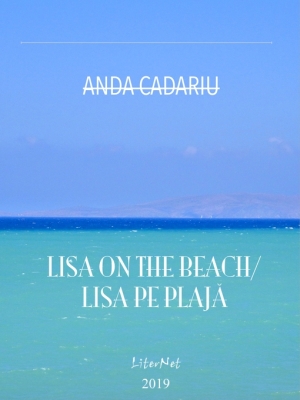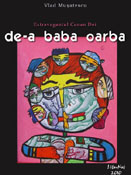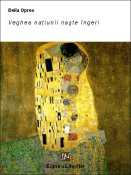You Know and So You Smile / Ştii şi zâmbeşti
Maria Manolescu
You Know and So You Smile
If people were allowed to write only about things that come from within, things that they know and understand, Anda Cadariu would definitely be among those mostly entitled to write about smiling. This was the first thing I saw at Anda when, very recently, I met her in person: a warm, intelligent and - I'd like to avoid the cliché, but maybe I shouldn't right now - a bit enigmatic smile.
However, I had known Anda for much longer, from her writings on LiterNet. Her reviews, interviews and short stories make you desire to read more, to linger with that smile that you can so obviously feel in everything she writes. People that, even for a short time, have worked in advertising, know that, when shooting a tv commercial or a radio ad, the clients are obsessed with asking the actors to render the text in a "more smiling" way. You know what I mean. I have always asked myself what's the opposite of that advertising smile. I guess it's Anda's: sincere, consistent, discreet, understood only by those who are looking for it. A gentle force. And there is more in it, totally opposing the advertising. In my opinion, Lisa on the Beach, although it opens a new stage in her writing, a more profound and relaxed one, still has something in common with her other writings. It is - and how could it not be? - "for free". (I am a lady, so I'm apologizing to those who may blame me and the likes that we are "selling ourselves short".) I am not going to tell you where exactly I found the quotation and what's the meaning of the "lady" thing - it's in one of Anda's short stories, also published for free.
Although LiterNet deserves more than a short mentioning, still I have to tell you that it is the place where I've drunk my coffee for at least thirteen years and only now I realise how much I've been taking it for granted and how little I've thought of the immense and not at all for-free work hiding beyond it!
But I'm coming back to the suspended cliché: enigmatic. It is a word so often connected with the famous painting, that I bet in an associative game, it would strongly function the other way round, as well. Enigmatic: Gioconda's smile. Why? Because a successful enigma is a simple one. When something seems simple and natural and still troubling, nagging us to look deeper into it, to explore more, we have the perfect enigma. What was Mona Lisa thinking about? What was her relationship with Leonardo? And with her husband? And with Napoleon, Freud, Dali, Duchamp and all the other famous and powerful men that tried, one way or another, to make her their own? Well, Anda Cadariu knows it. And not only because, unlike the majority of those who tried to tie Gioconda to their names, she is a woman. But because the author knows how to smile like her model.
She understands exactly, because she never asks herself: "what was there", but "what if". What if Lisa and Leonardo met today? What if Lisa drank virgin mojito and not White Coke (friends know what I am talking about). What if her mother was... (you will see for yourselves), what if Lisa listened to the respective music (I bet you'll never guess what music) or if, for one reason or another, she thought that the others see her as 'the absolute cow'. Anda has thought a lot about all these and she succeeded to write them simply enigmatically. In another story, also published in LiterNet, the author tells us how she retreated from a group, to write. "In fact, to do some research for my next story, Lisa on the Beach (...)". At the end of the day, she meets again her colleagues who come back "actually transformed. Very silent - it seems they'd played an intense game called Dim. A game that involves some meditation practice. (I am not surprised...)" I don't know about her colleagues' meditation, but I am happy that Anda preferred to research for her novella.
In fact, Lisa's enigma, like the one in the famous painting, stands in the relationship with the lookers-on. And I think I have just solved the puzzle: when she is looking at us, Mona Lisa sees everything, but absolutely everything: "what is good, what is bad, what is ugly". Still, she warmly smiles at us. Exactly like Anda Cadariu.
(November 2019, Maria Manolescu Borşa)
English version of the Foreword by Alina Nelega
****
Ştii şi zâmbeşti
Ştii şi zâmbeşti
Dacă oamenii ar avea voie să scrie numai despre lucruri care vin din ei, despre lucruri pe care le cunosc şi le stăpânesc foarte bine, atunci Anda Cadariu ar fi cu siguranţă printre cei mai îndreptăţiţi să scrie despre zâmbet. Acesta e primul lucru pe care l-am văzut la Anda, atunci când, de foarte curând, am cunoscut-o în carne şi oase: un zâmbet cald, inteligent, generos şi aşa, cum să zic - aş vrea să evit clişeul, dar poate că deocamdată nu trebuie -, un zâmbet puţin enigmatic.
Dar pe Anda o ştiu, prin scrisul ei de pe LiterNet, de mult mai mult timp. Cronicile, interviurile şi proza ei scurtă te fac să-ţi doreşti să citeşti mai mult, să stai puţin mai mult cu zâmbetul acela, care fireşte că se simte în tot ce scrie. Oamenii care au lucrat oricât de puţin în publicitate ştiu că, la înregistrările de spoturi radio sau TV, clienţii au o obsesie: ca actorii să dea textul "mai cu zâmbet". Ştiţi la ce mă refer. Mereu m-am întrebat care e opusul acelui zâmbet publicitar. Cred că e cel al Andei: sincer, consistent, discret, care se arată doar celor care-l caută. O forţă blândă. Şi mai e aici ceva cu totul şi totul opus publicităţii. Lisa pe plajă, deşi marchează, după mine, o etapă nouă în scrisul ei, mai profundă şi mai relaxată, are ceva important în comun cu celelalte scrieri ale sale. Este: "cum altfel? - gratis. (Sunt o doamnă, aşa că îmi cer scuze de pe-acum celor care ne reproşează - mie şi celor ca mine - că "stricăm piaţa".)" N-o să vă zic de unde exact e citatul şi care-i treaba cu acel "doamnă" - e din una din prozele Andei publicate tot gratuit.
Ar merita mult mai mult decât o scurtă paranteză, dar vreau să zic, chiar şi aşa, că LiterNet-ul e locul în care-mi beau dimineaţa cafeaua de cel puţin treisprezece ani, şi îmi dau acum seama cât de mult m-am obişnuit să mă bucur de el şi cât de puţin mă gândesc la imensa muncă generoasă şi deloc gratuită din spate!
Revin la clişeul suspendat: "enigmatic". Este un cuvânt atât de des asociat cu celebrul tablou, încât pariez că, într-un joc de asocieri, legătura ar funcţiona la fel de puternic şi invers. Enigmatic -> surâsul Giocondei. De ce? Pentru că o enigmă de succes e una care sfidează simplitatea. Atunci când ceva pare foarte simplu şi firesc, şi totuşi ne tulbură, ne sâcâie, ne cere să cercetăm, atunci se întâmplă enigma perfectă. La ce se gândea Mona Lisa? Care era relaţia ei cu Leonardo? Dar cu soţul ei? Dar cu Napoleon, Freud, Dalí, Duchamp şi toţi ceilalţi bărbaţi celebri şi puternici care-au încercat, printr-o interpretare sau alta, s-o facă a lor? Ei bine, Anda Cadariu ştie. Şi nu doar pentru că - spre deosebire de majoritatea celor care au încercat să o lege pe Gioconda de numele lor - e femeie. Ci mai ales pentru că autoarea ştie să zâmbească la fel de bine ca modelul său.
Înţelege tocmai pentru că nu se-ntreabă "oare ce-a fost?", ci "ce-ar fi dacă"? Ce-ar fi dacă Lisa şi Leo s-ar întâlni azi? Dacă ar avea conturi de Facebook? Ce-ar fi dacă Lisa ar bea virgin mojito (şi nu White Coke, prietenii ştiu de ce)? Ce-ar fi dacă mama ei ar fi (o să vedeţi), dacă Lisa ar asculta în căşti formaţia (pun pariu că n-aţi ghicit), dacă, dintr-un motiv sau altul, ar crede despre ea însăşi că ceilalţi cred că e "vaca absolută"? Anda s-a gândit mult la toate acestea şi a reuşit să le scrie enigmatic de simplu. Într-un alt text de pe LiterNet, autoarea ne povesteşte cum, în timpul unei rezidenţe în Bulgaria, se retrage din mijlocul grupului ca să scrie. "Mai exact, să mă documentez pentru următoarea mea povestire, Lisa on the Beach. [...]". La finalul zilei, se reîntâlneşte cu colegii, care se întorc "efectiv transformaţi. Foarte tăcuţi - se pare că au jucat un joc intens, numit Dim. Ceva care implică exerciţii de meditaţie. (Nu sunt surprinsă...)". Nu ştiu cum a fost meditaţia colegilor, dar eu una mă bucur mult că Anda a preferat să se documenteze pentru această nuvelă.
De fapt enigma Lisei, cea din povestea Andei, la fel ca cea din celebrul tablou, stă în relaţia cu privitorii ei. Şi cred că tocmai am dezlegat această enigmă: atunci când ne priveşte, Mona Lisa vede tot, dar absolut tot "ce era bun, ce era rău, ce era urât". Şi totuşi ne zâmbeşte cald. Exact cum face şi Anda Cadariu.
(noiembrie 2019, Maria Manolescu Borşa)


